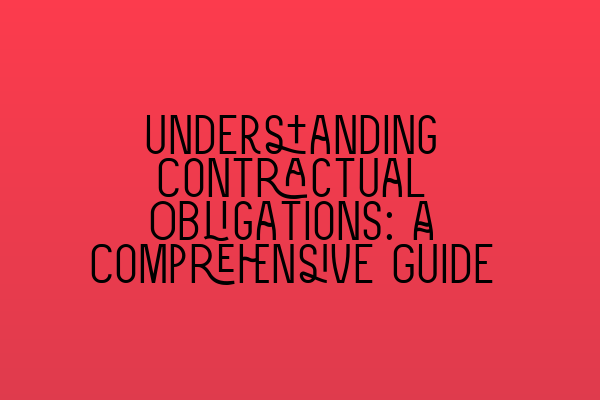Title: Understanding Contractual Obligations: A Comprehensive Guide
Introduction:
Welcome to our comprehensive guide on understanding contractual obligations. In the world of business, contracts are the building blocks that govern the relationships between individuals or parties involved. It is essential to have a clear understanding of contractual obligations to protect your rights, minimize risks, and ensure smooth transactions. In this blog post, we will break down the concept of contractual obligations, explore different types of obligations, and shed light on key considerations when entering into a contract.
1. What are Contractual Obligations?
Contractual obligations refer to the promises and commitments made by parties involved in a contract. These obligations outline the specific actions, responsibilities, and duties that each party is legally bound to fulfill. Understanding these obligations is crucial as they form the foundation of any contractual relationship.
2. Types of Contractual Obligations:
a. Express Obligations:
Express obligations are explicitly stated within the contract. They are often found in the form of terms and conditions, clauses, or specific agreements that both parties have agreed to. Express obligations leave no room for ambiguity and should be carefully reviewed to ensure clarity.
b. Implied Obligations:
Implied obligations are not explicitly mentioned in the contract but are understood to be inherent in the nature of the contractual relationship. These obligations arise from common practices, industry standards, customary behavior, or the behavior of the parties involved. It is crucial to be aware of these implied obligations as they can have legal implications.
c. Primary Obligations:
Primary obligations are the essential, fundamental obligations that directly fulfill the purpose of the contract. They are the backbone of the contractual relationship and are typically clearly defined in the contract. Breach of primary obligations can lead to significant consequences.
d. Secondary Obligations:
Secondary obligations are obligations that arise when there is a breach of primary obligations. These obligations aim to remedy the breach, compensate the injured party, or provide alternative solutions. Understanding secondary obligations is essential for effectively managing contractual disputes.
3. Key Considerations when Entering into a Contract:
a. Clear and Precise Contract Language:
To minimize confusion and avoid future disputes, contracts should be drafted in clear and precise language. Ambiguities or loopholes in the contract can lead to misunderstandings and potential legal problems.
b. Identifying and Assessing Risks:
Before entering into a contract, it is vital to identify and assess potential risks associated with the obligations involved. This includes analyzing the financial, operational, and legal risks that may arise.
c. Performance Monitoring and Reporting:
Both parties should establish mechanisms for monitoring and reporting performance throughout the contract term. This ensures that contractual obligations are fulfilled, deviations are identified, and prompt action is taken when necessary.
d. Contract Termination and Exit Clauses:
Contract termination and exit clauses define the conditions under which a contract can be terminated or renegotiated. These clauses should be thoroughly reviewed and negotiated to protect the interests of all parties involved.
Conclusion:
Understanding contractual obligations is vital for any business or individual involved in contractual relationships. By comprehending the different types of obligations, being aware of key considerations when entering into a contract, and seeking professional legal advice if needed, you can navigate the complexities of contractual obligations with confidence. Remember, a well-drafted contract that clearly defines obligations will help ensure a mutually beneficial and successful business relationship.
If you have any further questions or need professional assistance regarding contractual obligations, contact SQE Contract Law, your trusted experts in contract law and legal consultation.
